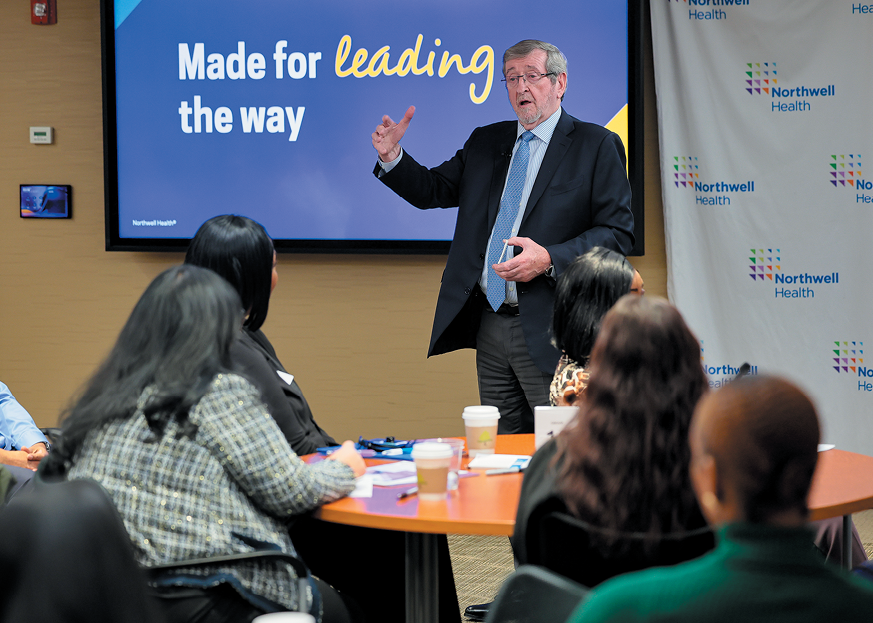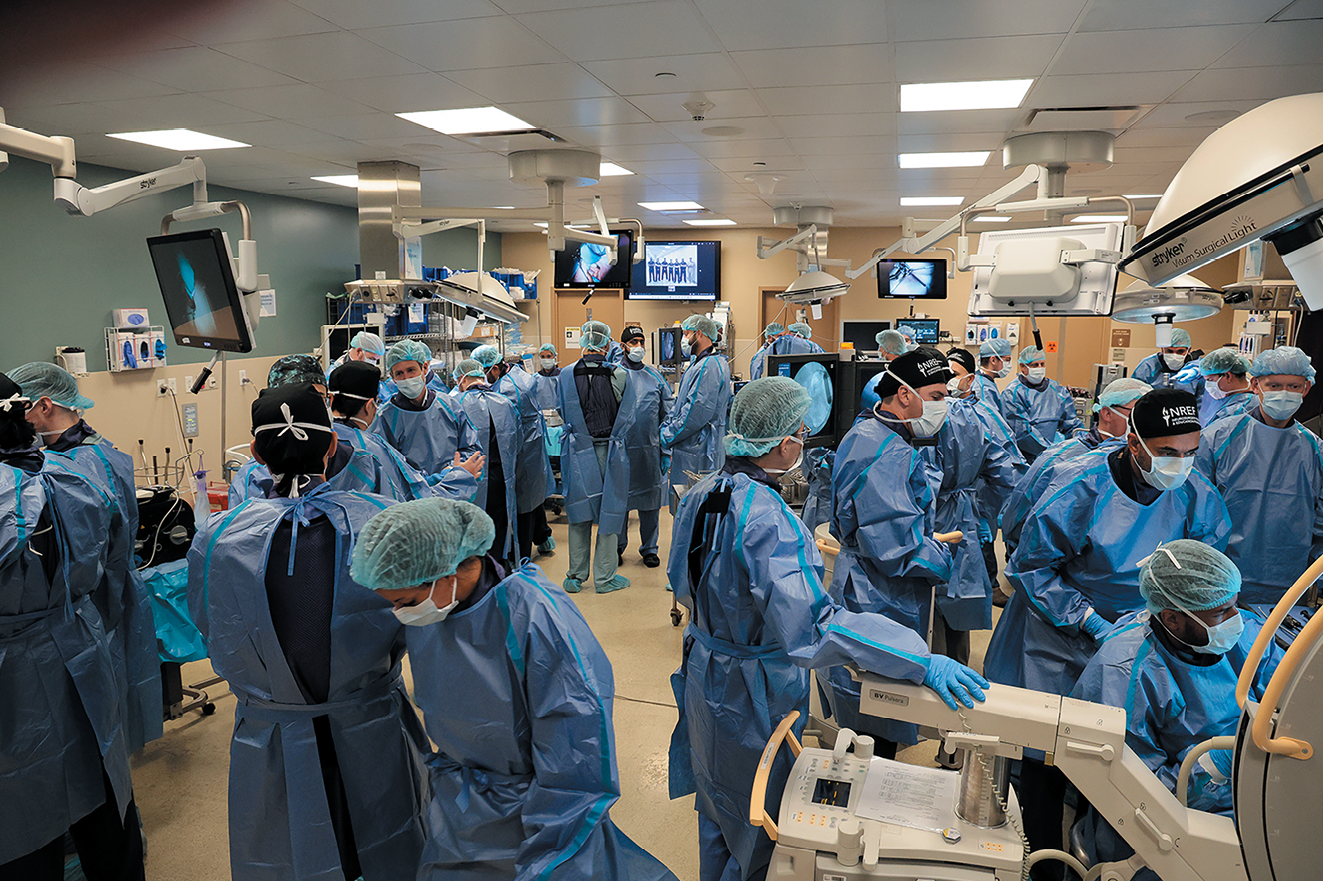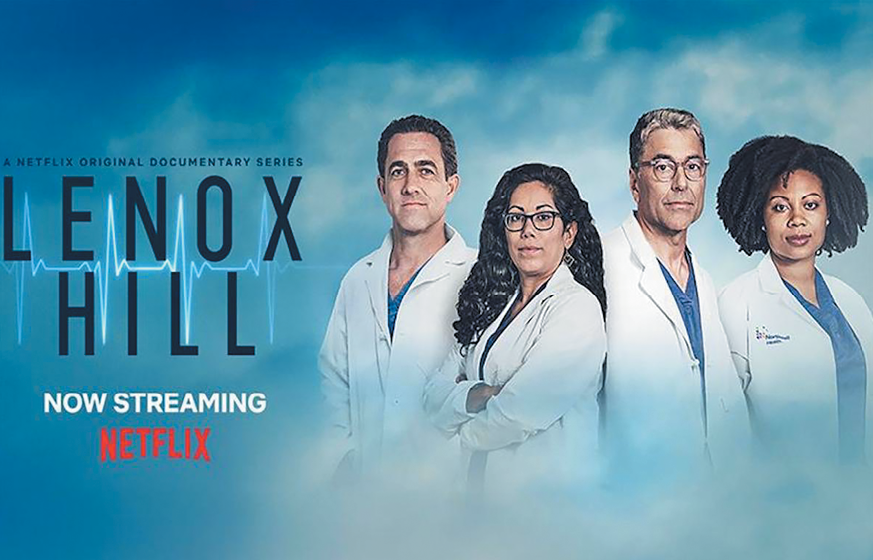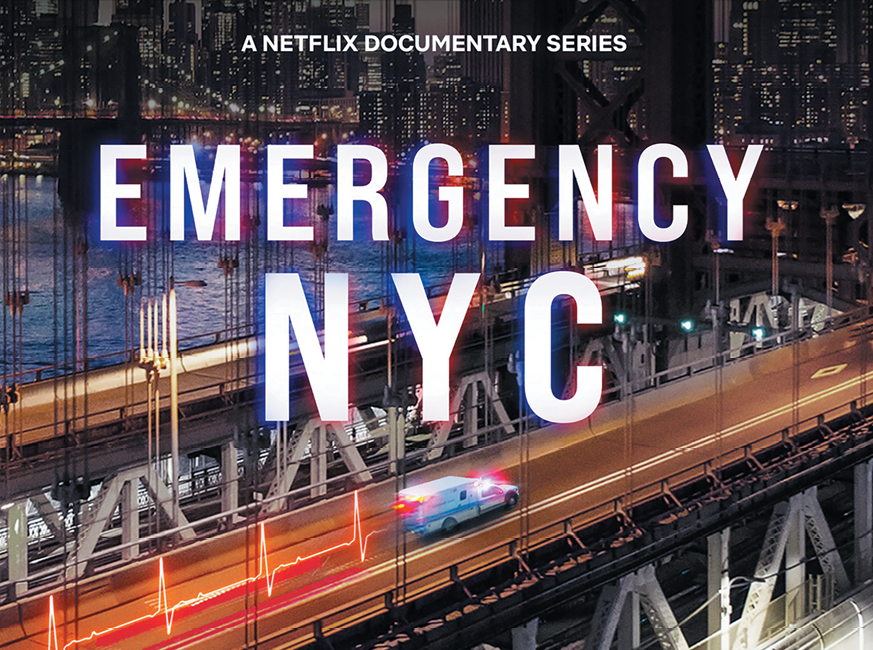- Home
- Media Kit
- MediaJet
- Current Issue
- Past Issues
- Ad Specs-Submission
- Reprints (PDF)
- Photo Specifications (PDF)
- Contact Us
- PRIVACY POLICY
- TERMS OF USE
![]()
ONLINE
![]()
ONLINE

Continuous Improvement
Editors’ Note
Michael Dowling is one of healthcare’s most influential voices, taking a stand on societal issues such as gun violence and immigration that many health system CEOs shy away from. His leadership has been invaluable to Northwell’s consistent expansion and prominence. In March 2020, he successfully navigated the health system through the first COVID-19 epicenter in the U.S., detailing Northwell’s experiences in a book titled, Leading Through a Pandemic: The Inside Story of Humanity, Innovation, and Lessons Learned During the COVID-19 Crisis. Overall, Northwell treated more than 300,000 COVID patients during the first two years of the pandemic – more than any other U.S. health system.
Prior to becoming CEO in 2002 and joining Northwell in 1995, Dowling served in New York State government for 12 years, including seven years as State Director of Health, Education, and Human Services and Deputy Secretary to former Governor Mario Cuomo. He was also Commissioner of the State Department of Social Services. Before entering public service, he was a Professor of Social Policy and Assistant Dean at the Fordham University Graduate School of Social Services and Director of the university’s Westchester County campus. Dowling has been honored with many awards and recognitions over the years, including the Ellis Island Medal of Honor, the Presidential Distinguished Service Award for the Irish Abroad, the Alfred E. Smith Award from the American Society for Public Administration, the National Human Relations Award from the American Jewish Committee, and the Foreign Policy Association Medal Award. In 2017, he was selected to serve as the Grand Marshal of New York’s St. Patrick’s Day Parade. In 2022, he was named the most influential leader in healthcare by Modern Healthcare, ranking number 1 in its annual list of the “100 Most Powerful People in Healthcare,” a list on which he has been featured for 18 consecutive years.
Dowling is a member of the Institute of Medicine of the National Academies of Sciences, the Foreign Policy Association, and the North American Board of the Smurfit School of Business at University College, Dublin, Ireland. He is past chair and a current board member of the National Center for Healthcare Leadership (NCHL), the Greater New York Hospital Association, the Healthcare Association of New York State, the Healthcare Institute, and the Institute for Healthcare Improvement (IHI). Dowling was an instructor at the Center for Continuing Professional Education at the Harvard School of Public Health. He earned his undergraduate degree from University College Cork (UCC), Ireland, and his master’s degree from Fordham University. He also has honorary doctorates from the prestigious Queen’s University Belfast, University College Dublin, Hofstra University, Dowling College, and Fordham University.
Institution Brief
Northwell Health (northwell.edu) is a clinical, academic, and research enterprise with a workforce of about 90,000 and annual revenue of nearly $20 billion. Northwell is the largest healthcare provider and private employer in New York State, caring for more than two million people annually through a vast network of 21 hospitals, more than 950 outpatient facilities, including 75 urgent care centers, as well as home care, rehabilitation, and end-of-life programs. Northwell also pursues pioneering research at the Feinstein Institutes for Medical Research and a visionary approach to medical education highlighted by the Zucker School of Medicine, the Hofstra Northwell School of Nursing and Physician Assistant Studies, and one of the nation’s largest medical residency and fellowship programs.

Michael Dowling at a recent employee orientation.
For more than 20 years, the Northwell leader has attended
the weekly sessions personally meeting with every new hire
to emphasize Northwell’s values like teamwork, compassion,
and a strong commitment to patient care. He sees this hands-on
approach as crucial to building a strong company culture
from day one.
What are you most focused on when you look at addressing the future challenges in healthcare?
At a high level, if you are in the business of healthcare, you have to constantly fight the risk of complacency – the attitude that what you do is good enough, when in truth it never is. If you want to be the best, you should never be completely satisfied. At Northwell, we are constantly raising the bar and looking at everything we do in different ways. This starts with understanding that your biggest competitor is the status quo. The healthcare industry does phenomenal work, and the advances that have been made in the last 50 years are truly mindboggling. Having said that, it raises the bar of expectations to continue to do more and constantly innovate.
A major issue facing the industry is the equity of access. It is about making sure that the services available to the people who are well-connected are also available to everyone else. This is a constant struggle that every health system is facing. It is not about whether a person will get service; it is about whether they will get that service in a timely fashion and get the best results. The problem is caused by a number of things: there is a level of bureaucracy that impacts it; there is the issue of workloads and availability of physicians; there is the increasing demand for healthcare because people have become much more educated in what it is they need.
Another big issue is that most people are very willing to accept help when they are ill, but unwilling to accept advice to help them stay well. If we can get people to take advice early and to focus on prevention and wellness, we would definitely be able to reduce costs over time. This is an area that requires more attention and where we need to improve.
Holding the line on rising healthcare costs is a big challenge. I do not believe costs are ever coming down given the growth in chronic illness, new innovations that allow us to better diagnose and treat people better than we ever could before, and the demands of the nation’s aging population. We can and should, however, reduce the rate of cost growth.
One of the greatest benefits of large integrated systems, when organized properly, is the ability to provide the full continuum of care – from birth to end of life – and have such care provided in a coordinated and seamless manner. Achieving such outcomes should be a constant goal. It is at Northwell.

As the number of children and adolescents in need of
mental health support continues to increase at alarming rates,
Northwell Health is expanding pediatric behavioral health including
creating a new model of care and building a preeminent center
of mental health excellence that will bridge the gap between physical
and mental health services for children. Rendering of the Child and
Adolescent Mental Health Pavilion, which will be connected to
Cohen Children’s Medical Center and Zucker Hillside Hospital,
Northwell’s adult mental health facility, in Queens, New York.
You mention the advances that have taken place in healthcare and the amazing innovations in providing care. Is this well-understood by the public?
The healthcare industry does not get the credit it deserves and gets blamed for many things that are not under its control. For example, hospitals, health systems and clinicians are not responsible for the production of unhealthy food loaded with sugar, salt and other additives. And we have no control over what parents feed their kids, leading so many of them to become obese. Similarly, we can’t stop people from drinking too much or taking drugs. All of these are indicators of bad health caused by self-destructive lifestyle choices. Another example is gun violence, which killed nearly 41,000 Americans last year, including more than 1,400 kids who die each year. Guns are the leading cause of death for children and adolescents in this country, which is shameful.
Hospitals and health systems bear the consequences of all these social determinants of health, even though all of them are beyond our control. We must, however, be aggressively involved in helping to alleviate such conditions – such as Northwell’s involvement in Gun Violence Prevention and Safety.
“A major issue facing the industry is the equity of access. It is about making sure that the services available to the people who are well-connected are also available to everyone else. This is a constant struggle that every health system is facing. It is not about whether a person will get service; it is about whether they will get that service in a timely fashion and get the best results.”
Northwell Health has been a leader in addressing the mental health crisis. Will you discuss this effort?
We are the second largest provider of mental health in New York State. We care for more than 25,000 patients per year – a relatively small percentage of the overall need which is growing. It is one of our major priorities.
It is a challenging area for a number of interrelated reasons. Treatment is complicated, more so, in my view, than other areas such as heart disease or orthopedics. Care of the mentally ill has too often been isolated and siloed, separated and not integrated with primary care and physical health. Payment for mental health is mostly through Medicaid where reimbursement is never adequate to meet the cost – resulting in most providers losing money as they expand to meet the growing need (this is true also at Northwell). And then there is the shortage of personnel – physicians, nurses and social workers for instance.

Northwell Health’s Center for Learning and Innovation (CLI),
a leading hub for cutting-edge healthcare education, recently hosted
an advanced spinal surgery course for senior-level neurosurgical
residents from across the U.S.
All of the above issues are being addressed in varying degrees by these major providers who have a major commitment. The journey and the task is extremely difficult.
One of the biggest and most disturbing issues is the growing mental health problems among adolescents – the acceleration of anxiety, depression and suicide. Many associate this growing problem with the growing addiction to social media. We at Northwell plan to hold educational forums to highlight the health ill-effects of social media which I believe must become a national priority requiring the involvement of all businesses and industries as well as government.
Despite all these issues I believe that we need to remain optimistic about the possibility of ongoing positive change. The good news is that people today are willing to talk about mental health much more than they were years ago. It has become less stigmatized. Among the reasons is the growing willingness by many high profile people in the entertainment and sports industry as well as business to be open about their own struggles. I can assume, with some confidence, that almost every reader of this magazine knows or has heard of someone who is suffering from some mental health issue.

Northwell Studios builds on the health system’s track record
of producing award-winning documentaries like the Netflix Series
Lenox Hill and Emergency NYC that have reached millions of
viewers worldwide across every major platform.
How has Northwell Studios progressed, and will you discuss its purpose?
The studio is virtual; it’s all our hospitals and facilities. The purpose is to harness the power of storytelling and entertainment to humanize healthcare, spark meaningful conversations, and educate the public and policymakers on the reality of what occurs each day in healthcare facilities. It started at Lenox Hill Hospital where we allowed a Netflix documentary film crew to follow our neurosurgeons, emergency medicine clinicians and others in their day-to-day interactions with patients, resulting in a docuseries called Lenox Hill. When COVID hit, we allowed another documentary film crew into one of our tertiary hospitals (Long Island Jewish Medical Center) to experience what was happening during the first four months of the pandemic. The resulting documentary, called First Wave, which is now available on Hulu and Disney, was critically acclaimed, receiving many awards. We also were the focus of a second Netflix docuseries, called Emergency NYC, that provides an intimate portrait of the lives of medical professionals, including their triumphs and the complications they face every day. Last year, HBO Max posted a two-part documentary, One South – Portrait of a Psych Unit, that provided an intimate and uplifting look at one of the country’s few inpatient psychiatric units (at Zucker Hillside Hospital in Queens) that specializes in treating college students for serious mental health issues. We are talking to Netflix and other outlets about additional opportunities in the future. This is an exciting endeavor, and I think more health systems should follow our lead. I think it’s good for the morale of the organization, and it helps the public to better understand what we do each day.

What needs to be done in order for the industry to attract the talent required to meet the future needs in healthcare?
We need to invest in talent development and have a commitment to continuous learning. I am convinced that people don’t just want to work for an organization – they want to belong to a cause, to be part of something that has real purpose, that is not afraid to take tough positions in resolving issues important to society at large – such as climate change, gun violence and mental health issues.
At Northwell, talent and leadership development are top priorities. That is why we created an internal “corporate university” called the Center for Learning and Innovation. This Fall we will, in partnership with New York City and the Bloomberg Foundation, open the Northwell High School of Health Sciences with an enhanced curriculum focused on nursing, behavioral health, medical assisting, and health management. This is another innovative initiative to get young people inspired by and connected to career opportunities in healthcare – and becoming part of the workforce of the future. It is why we developed an innovative curriculum at our medical and nursing schools, and why we work with over 60 high schools (this year touching over 100,000 students) to make them aware of career opportunities that exist in healthcare. We offer internships, apprenticeships and a scholarship program for high school and college students. The talent we have today, as good as it is, will not be good enough for tomorrow. We have to create a talent pipeline for years to come.
You are very clear about Northwell’s focus on continuous improvement. How critical is this mentality to Northwell’s culture?
It is essential – otherwise you run the risk of becoming stagnant. I never want our leadership team to be comfortable. It is like a sports team. If you want to be great, you can never fall into the trap of believing that you will always win. At Northwell, there is nothing that we do today that can’t be better in the future. Our focus is on continuous improvement, which requires good people, a winning attitude and a commitment to always raising the bar. It also means learning from failure – of which we have had many. As Churchill so aptly stated, “Success is going from failure to failure without a loss of enthusiasm.”![]()